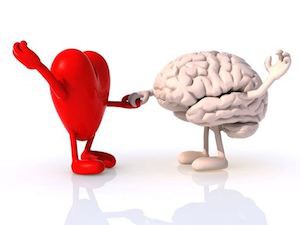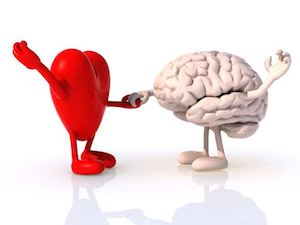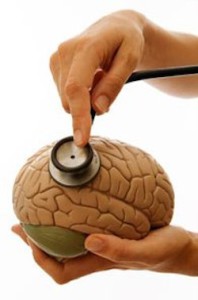With the advent of new and sophisticated brain imaging techniques, science has learned so much in the last few years about maintaining brain health – this, of course, gives the optimum opportunity for memory to stay sharp and reliable.
Follow these 10 ways to love your brain, and your brain will reward you handsomely.
 Follow Your Heart. There is plenty of evidence showing that risk factors for cardiovascular disease and stroke (obesity, high blood pressure, diabetes) negatively impact your brain health. Take care of your heart and a healthy brain will follow.
Follow Your Heart. There is plenty of evidence showing that risk factors for cardiovascular disease and stroke (obesity, high blood pressure, diabetes) negatively impact your brain health. Take care of your heart and a healthy brain will follow.
Spend time with friends. Staying socially engaged supports brain health. Find social activities that are meaningful to you. Be part of your local community. If you love animals, have you thought of volunteering at a local shelter. If you enjoy singing, find a choir or help at an afterschool or pre-school programme. Share activities with friends and family.
 Use the right fuel! Eat a healthy and balanced diet that’s higher in fruit and vegetables to help reduce the risk of cognitive decline. Plenty of foods rich in antioxidants are known to contribute to risk reduction.
Use the right fuel! Eat a healthy and balanced diet that’s higher in fruit and vegetables to help reduce the risk of cognitive decline. Plenty of foods rich in antioxidants are known to contribute to risk reduction.
Break a sweat. Engaging in regular cardiovascular exercise that raises your heart rate and increases blood flow to the brain and body reduces the risk of cognitive decline. A good oxygen supply is crucial for brain health and this a wonderfully efficient way of supplying it.
 Butt out! Evidence is clear – smoking increases the risk of cognitive decline. The good news is that quitting smoking can reduce that risk to levels comparable to those who haven’t smoke. The toxins in smoke are definitely not good for your brain.
Butt out! Evidence is clear – smoking increases the risk of cognitive decline. The good news is that quitting smoking can reduce that risk to levels comparable to those who haven’t smoke. The toxins in smoke are definitely not good for your brain.
 Catch some Zzzzzz’s. Not getting enough sleep due to conditions such as insomnia or sleep apnoea may result in problems with memory and thinking. Get into the habit of a relaxed approach to bedtime to help with a good night’s sleep.
Catch some Zzzzzz’s. Not getting enough sleep due to conditions such as insomnia or sleep apnoea may result in problems with memory and thinking. Get into the habit of a relaxed approach to bedtime to help with a good night’s sleep.
Hit the books. Formal education at any stage of life will help your brain to work efficient and reduce your risk of cognitive decline and dementia. You can take a class at a local college, community centre, or even online. There are wonderful opportunities for interesting study.
 Challenge yourself. Challenge and activate your mind. Build a piece of furniture. Complete a jigsaw puzzle. Do something artistic. Play games such as chess, bridge or cards that make you think strategically. Challenging your brain has short and long-term benefits for your brain.
Challenge yourself. Challenge and activate your mind. Build a piece of furniture. Complete a jigsaw puzzle. Do something artistic. Play games such as chess, bridge or cards that make you think strategically. Challenging your brain has short and long-term benefits for your brain.
Try the games on GrownUps: Look for the games from the Memory Foundation amongst the games – they have been especially developed to help memory. Click on the link to access them: Memory Foundation Games
Take care of your mental health. Many studies link a history of depression with increased risk of cognitive decline. Seek medical help if you have symptoms of depression, anxiety or other mental health concerns. Try to manage stress, too, as this does affect memory as well as brain health.
 Heads Up. Brain injury can increase your risk of thinking and memory problems, and even dementia. Make sure you wear your seat belt in cars, and use a helmet if riding a bike. Take steps to prevent falls – get rid of loose mats and clutter. Wear low-heeled shoes, and be sure stairs are well lit and have sturdy rails. Be especially careful when the floors or concrete is wet.
Heads Up. Brain injury can increase your risk of thinking and memory problems, and even dementia. Make sure you wear your seat belt in cars, and use a helmet if riding a bike. Take steps to prevent falls – get rid of loose mats and clutter. Wear low-heeled shoes, and be sure stairs are well lit and have sturdy rails. Be especially careful when the floors or concrete is wet.
Dr. Allison Lamont and her sister, Gillian Eadie, are the co-founders of the Memory Foundation. Visit the website for loads of information on your brain and memory, or visit my Auckland Memory Clinic website to read about your memory. Look out for our book 7-Day Brain Boost Plan which provide you with a detailed step-by-step plan to have your brain health right on track. Please contact me with any queries you have about brain and memory: Dr.Lamont@memoryclinic.co.nz













Join the Discussion
Type out your comment here:
You must be logged in to post a comment.